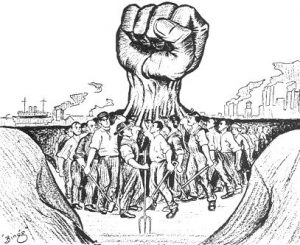
SEATTLE—A quick look around the Boeing factories reveals a massive array of productive forces. The countless numbers of machines, designs and assembly lines that integrate the millions of parts that go into making jets is mind-boggling. Generations of workers built these factories. Even more millions continue to pour their labor into manufacturing these planes. And this is only one company.
But look around the factory now. The machines are idle, the MAX assembly line abandoned. Subcontracted workers have been kicked out the door. Workers in Boeing’s own factories have been shifted to other locations, in many cases adding 6 hours to their commute. And when they finally reach their destinations, they are told to sweep the floors.
The Capitalist System and Its Contradictions
Capitalism unleashed vast forces of production when it defeated feudalism hundreds of years ago. This fantastic power of production could easily end homelessness, build sewage plants, provide electricity and clean drinking water, etc. Modern industry could overcome these problems—and many more—in relatively short order. But like feudalism hundreds of years ago, capitalism itself is now holding us back. It has outlived its usefulness.
Within capitalism there is a contradiction powerful enough to restrict productive forces. The contradiction between the immense forces of production and the capitalist relations of production continuously sends this system into crisis.
This contradiction is imbedded in capitalism. We call it a dialectical contradiction because, in part, it generates change. Under capitalism, the fight between unleashing the forces of production and the requirement to make profits for the bosses is inescapable and, ultimately, deadly.
Capitalists will activate the forces of production only if they can sell the things produced by workers’ labor. Their production collapses if they can’t realize a profit selling these products.
Boeing told us when they were designing the MAX that they had to cut the cost of producing this new jet. Competition from Airbus meant the company was making less profit on each jet delivered. Their answer was to make and sell more planes.
Airbus was saying the same thing to its workforce. Within a year or two, Chinese aircraft will be added to the mix. Everyone knows too many planes will be produced for a limited market. The inevitable global crisis of overproduction will destroy productive forces and our lives along with them.
Overproduction has been chronic since at least 1900. It led to World War I, the great depression, World War II and the 2008 crisis. It is creating increasing inequality, a tariff war, a manufacturing recession in the U.S., India, South Africa and other countries. Sharpening economic rivalries are forcing major powers to resort to real war, as in the periods leading up to WWI and WWII.
Communism: Production for Workers’ Needs, Not for Profits
Communism will resolve this contradiction by abolishing markets and production for profit. Overproduction will be a horrible memory of a long-dead system.
We will produce for the needs of our class. We will produce as much as we need of whatever we need. That will be the end of hunger, homelessness, lack of medical care and all the material hardships of capitalism.
Freeing productive forces from capitalist relations of production is vital to the well-being of the world’s workers. Communist production will create new relationships. No profits, markets and, importantly, no wage system.
Over the next few weeks, a dozen Boeing workers will expand their discussion to focus on communist relations of production. We look forward to hearing from other collectives at worksites, schools, etc. around the world. Help us out!
Capitalist crisis causes intensified exploitation, leading to many kinds of revolts. Unfortunately, these revolts will never spontaneously result in communist revolution. We need a massive ICWP for that. So our next question is: “Will dialectical discussions like these help your collective grow the party and mobilize our friends for communism?”

